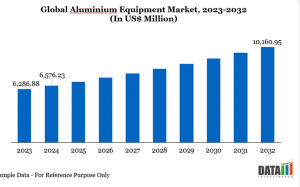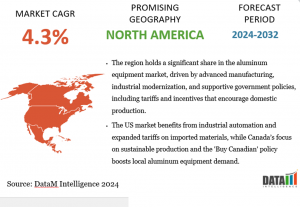Aluminium Equipment Industry Sector to Hit US$10,160.95B by 2032 | 5.70% CAGR Driving Global Growth
Aluminium Equipment Market Growth to US$10.16B by 2032 | Global Industry Trends & Insights
USA Aluminium Equipment Industry Outlook 2025-2032 | Market Growth from US6,576.23M to US$10,160.95M at 5.70% CAGR”
AUSTIN, TX, UNITED STATES, September 30, 2025 /EINPresswire.com/ -- Market Size and Forecast— DataM Intelligence 4Market Research LLP
Aluminium Equipment Market was valued at US$ 6,576.23 million in 2024 and is projected to grow to US$ 10,160.95 million by 2032, registering a CAGR of 5.70% between 2025 and 2032.
Market Size and Future Outlook
1. 2024 Market Size: US$6,576.23 Million
2. 2032 Projected Market Size: US$10,160.95 Million
3. CAGR (2025-2032): 5.7%
4. Largest Market: Asia-Pacific
5. Fastest Market: North America
Get a Sample PDF Of This Report (Get Higher Priority for Corporate Email ID):– https://www.datamintelligence.com/download-sample/aluminium-equipment-market
Industry Trends and Strategic Insights
In 2024, the Asia-Pacific region led the global market, accounting for the largest revenue share of 60.01%.
By equipment type, the machinery & industrial equipment segment is expected to dominate, representing 40.36% of the market in 2024.
Growing attention to industrial automation and efficiency is driving continued investments in cutting-edge aluminum equipment. In March 2024, the US announced a US$500 million initiative to construct its first primary aluminum smelter in 45 years, aiming for a sustainable, low-carbon facility, further enhancing the need for machinery and industrial equipment across sectors.
The push for automation and operational efficiency is spurring investments in advanced aluminum equipment. In March 2024, the US government pledged US$500 million to build its first primary aluminum smelter in decades, a green, low-carbon project emphasizing domestic production, which is expected to increase demand for industrial machinery.
Today, over half of the world’s population (55%) lives in urban centers, with projections showing this will reach 68% by 2050, adding around 2.5 billion city dwellers
Market Dynamics
Drivers of Growth
Demand for Lightweight Materials: The automotive and aerospace industries are increasingly adopting aluminium equipment to reduce weight and improve fuel efficiency. Aluminium's lightweight nature makes it an ideal material for manufacturing components such as engine parts, frames, and body panels.
Corrosion Resistance: Aluminium's resistance to corrosion makes it suitable for applications in harsh environments, including marine and chemical processing industries. This property extends the lifespan of equipment and reduces maintenance costs.
Recyclability: Aluminium is 100% recyclable without loss of quality, making it an environmentally friendly choice. The growing emphasis on sustainability and circular economy principles is driving the adoption of aluminium equipment.
Challenges
High Production Costs: The production of aluminium equipment involves complex processes and high energy consumption, leading to elevated costs. Fluctuations in energy prices can further impact the overall production expenses.
Competition from Alternative Materials: Materials such as steel and composites offer similar properties to aluminium and may be preferred in certain applications due to cost or performance considerations.
Key Players
1. Alcoa Corporation
2. Hydro Aluminium
3. Constellium SE
4. Kaiser Aluminum
5. Novelis Inc.
6. Sapa Group (part of Hydro)
7. Plexal Aluminium
8. Kitz Corporation
9. Ryerson Holding Corporation
10. Aluminium Ltd
Get Customization in the report as per your requirements:- https://www.datamintelligence.com/customize/aluminium-equipment-market
Market Segmentation
By Equipment Type
Machinery & Industrial Equipment: This segment holds the largest market share, accounting for approximately 40.36% in 2024. The demand for aluminium machinery and industrial equipment is driven by the need for lightweight and durable components in manufacturing processes.
Transportation Equipment: Aluminium's use in transportation equipment, including vehicles and aircraft, is expanding due to its lightweight properties that contribute to fuel efficiency.
Construction Equipment: The construction industry is adopting aluminium equipment for scaffolding, formwork, and other applications where strength-to-weight ratio is crucial.
By End-Use Industry
Automotive: The automotive industry is a significant consumer of aluminium equipment, utilizing it in the production of lightweight vehicles to meet fuel efficiency standards and reduce emissions.
Aerospace: Aluminium's strength-to-weight ratio makes it a preferred material in the aerospace industry for manufacturing aircraft components.
Marine: The marine industry employs aluminium equipment for shipbuilding and offshore structures due to its corrosion resistance and lightweight properties.
Industrial Manufacturing: Aluminium equipment is used in various industrial manufacturing processes, including material handling and processing equipment.
Buy Now & Unlock 360° Market Intelligence:- https://www.datamintelligence.com/buy-now-page?report=aluminium-equipment-market
Regional Insights
Asia-Pacific: The Asia-Pacific region dominates the aluminium equipment market, capturing the largest revenue share of 60.01% in 2024. Rapid industrialization, urbanization, and infrastructure expansion in countries like China and India are driving the demand for aluminium equipment.
North America: North America is expected to witness the fastest market growth during the forecast period. The U.S. and Canada are focusing on adopting lightweight materials in automotive and aerospace industries, contributing to the increased demand for aluminium equipment.
Europe: Europe holds a significant share in the aluminium equipment market, with countries like Germany and the UK leading in the adoption of aluminium equipment in automotive and industrial sectors.
North America: Key Market Share Driven by Advanced Manufacturing
North America holds a strong share in the global aluminum equipment market, fueled by advanced manufacturing, industrial automation, and demand from automotive, aerospace, and construction sectors. Government policies, tariffs, and infrastructure development further boost domestic production and adoption of high-efficiency aluminum equipment.
U.S. Market Insights
Modernization in automotive and industrial sectors, along with lightweight aluminum adoption, drives the U.S. market. In August 2025, expanded tariffs on 407 products, including wind turbines and automotive parts, support domestic production, indirectly promoting local aluminum equipment demand.
Canada Market Growth
Canada benefits from abundant aluminum resources and a focus on sustainable production. Infrastructure expansion and industrial growth, coupled with the proposed 'Buy Canadian' policy, strengthen domestic manufacturing and drive demand for local aluminum equipment.
Asia-Pacific: Largest Regional Share
Asia-Pacific leads the market due to rapid industrialization, urbanization, infrastructure growth, and high demand in construction, transportation, and manufacturing. Government incentives and advanced machinery adoption further support market expansion.
India Market Outlook
India’s market is driven by rapid urbanization and infrastructure development, with an expected addition of 270 million urban residents by 2040. Industrial growth, construction, and transportation needs boost demand for aluminum equipment.
China Market Trends
China dominates the region as the largest aluminum producer, modernizing production with greener and more efficient practices. Infrastructure projects, industrial demand, recycling initiatives, and urbanization drive continued growth in aluminum equipment usage.
Market Trends
Adoption of Additive Manufacturing: The integration of additive manufacturing technologies, such as 3D printing, in the production of aluminium equipment is gaining traction. This allows for the creation of complex geometries and customized components, reducing material waste and production time.
Focus on Sustainability: Manufacturers are increasingly focusing on producing aluminium equipment using sustainable practices. This includes sourcing aluminium from recycled materials and implementing energy-efficient production processes.
Technological Advancements: Innovations in aluminium alloys and coatings are enhancing the performance and durability of aluminium equipment, expanding its applications across various industries.
Strategic Recommendations
Investment in Research and Development: Companies should invest in R&D to develop advanced aluminium alloys and coatings that offer improved performance characteristics, catering to the evolving needs of end-use industries.
Sustainability Initiatives: Emphasizing sustainability by adopting recycling practices and energy-efficient production methods can enhance brand reputation and meet regulatory requirements.
Market Expansion: Exploring emerging markets, particularly in Asia-Pacific and Africa, can provide growth opportunities. Tailoring products to meet regional requirements and standards will be crucial for success.
Strategic Partnerships: Collaborating with OEMs and end-users in key industries can facilitate the development of customized aluminium equipment solutions, fostering long-term business relationships.
Conclusion
The aluminium equipment market is poised for significant growth, driven by the increasing demand for lightweight, durable, and corrosion-resistant materials across various industries. By focusing on innovation, sustainability, and strategic partnerships, companies can capitalize on the opportunities presented by this expanding market.
Related Reports
Aluminium Scrap Market
Aluminium Foil Market
Sai Kiran
DataM Intelligence 4Market Research LLP
877-441-4866
sai.k@datamintelligence.com
Visit us on social media:
LinkedIn
X
Legal Disclaimer:
EIN Presswire provides this news content "as is" without warranty of any kind. We do not accept any responsibility or liability for the accuracy, content, images, videos, licenses, completeness, legality, or reliability of the information contained in this article. If you have any complaints or copyright issues related to this article, kindly contact the author above.


